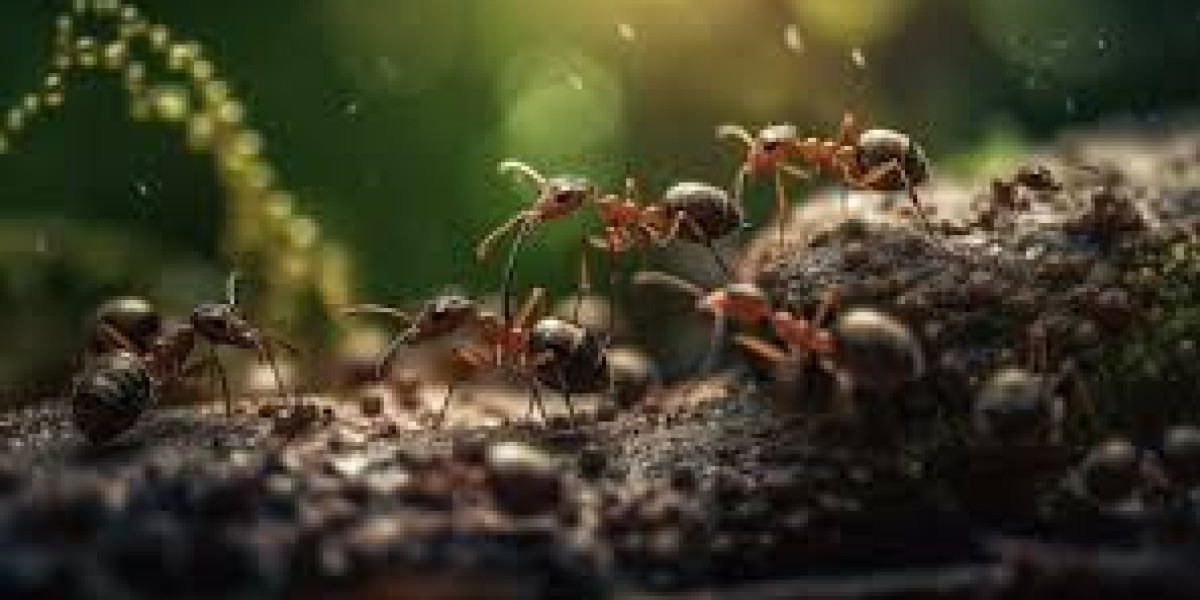Ants are tiny creatures, but they can quickly become a big nuisance. Whether they’re crawling around your kitchen, invading your pantry, or building nests in your garden, ants are persistent pests. The good news is, with a little understanding and the right methods, you can control their presence and stop them from becoming a problem.
Understanding Why Ants Invade
Ants are highly social insects that work together to gather food and protect their colony. While they usually live outdoors, they often enter homes in search of food, water, and shelter. If they find what they need, they leave behind a chemical trail for other ants to follow, which is why you may see an entire line of them moving in and out of your space.
Common reasons ants invade include:
- Food crumbs and spills: Even small traces of sugary or greasy food can attract ants.
- Unsealed containers: Open packages of food, especially sweets and grains, are an easy target.
- Moisture: Ants often look for water in sinks, leaky pipes, or damp areas.
- Warmth and shelter: Your home can provide the perfect environment for ants to thrive.
Understanding what draws ants to your home is the first step in preventing them.
Signs of an Ant Infestation
Ants are small, so it might be hard to notice them at first. However, there are some clear signs that you’re dealing with more than just the occasional visitor:
- Trails of ants: A steady stream of ants moving back and forth is a strong indicator of an infestation.
- Small piles of dirt or debris: These could be ant nests, especially around baseboards or cracks in walls.
- Food damage: If you notice tiny holes in food packaging or see ants inside, they’ve already made themselves at home.
Once you spot any of these signs, it’s time to act quickly to prevent the problem from escalating.
Natural Ways to Keep Ants Away
If you prefer eco-friendly solutions, there are plenty of natural remedies that can help deter ants without using harmful chemicals. Here are some simple options:
- Vinegar Solution
Mix equal parts of white vinegar and water in a spray bottle. Use this mixture to wipe down surfaces where you’ve seen ants. Vinegar disrupts the scent trails that ants use to navigate. - Lemon Juice
Similar to vinegar, lemon juice masks the ants' scent trails. Squeeze fresh lemon juice around entry points, windowsills, and cracks. - Peppermint Oil
Ants dislike strong smells like peppermint. Add a few drops of peppermint essential oil to a cotton ball and place it near entry points. - Cinnamon Powder
Sprinkling cinnamon near ant trails and entryways can act as a barrier. The strong smell confuses ants and keeps them away. - Diatomaceous Earth
This natural powder is safe for humans and pets but lethal to ants. Sprinkle it around areas where ants are active, and it will dehydrate and kill them.
Preventing Ants from Entering Your Home
Prevention is the best approach to managing ants. If you can stop them from entering in the first place, you won’t have to deal with an infestation. Here are some simple preventive measures:
- Seal Cracks and Gaps
Inspect your home for small cracks, gaps, or holes where ants might enter. Use caulk to seal these entry points. - Keep Your Home Clean
Wipe down surfaces regularly, especially in the kitchen. Clean up spills immediately, and make sure to vacuum crumbs. - Store Food Properly
Keep food in airtight containers to prevent ants from accessing it. Don’t forget to store pet food securely as well. - Take Out the Trash
Empty your garbage bins regularly and use trash bags with tight seals to avoid attracting ants. - Trim Plants Near Your Home
Ants often use branches or plants as bridges to get inside. Trim shrubs, trees, and plants that touch your walls or windows.
Safe and Effective Solutions for Ant Infestations
If ants have already established themselves, you’ll need to take stronger action. Here are some safe and effective ways to eliminate them:
- Bait Traps
Ant bait traps are a common and effective way to deal with infestations. The ants carry the bait back to their colony, which helps to eliminate the entire group. - Boiling Water
Pouring boiling water directly into outdoor ant nests can kill ants and destroy their colonies. - Homemade Sugar and Borax Trap
Mix sugar and borax with water to create a paste. Place small amounts near ant trails. The sugar attracts ants, while the borax kills them. - Insecticide Sprays
For severe infestations, you may need to use insecticides. Look for products specifically designed for ants and follow the instructions carefully.
The Role of Professional Help
In some cases, a DIY approach might not be enough, especially if the infestation is severe or recurring. This is where professional pest control services can be invaluable.
Professionals have the tools and knowledge to locate ant nests, identify the species, and apply targeted treatments. This can save you time and effort while ensuring the problem is resolved for good.
If you’re dealing with a stubborn ant problem, consider pest control for ants as a reliable solution. Professionals not only eliminate ants but also offer advice on how to prevent future invasions.
How to Keep Ants Out of Your Garden
Ants are not just a problem indoors—they can also cause issues in your garden. They may farm aphids for their honeydew or disturb the roots of plants. Here’s how to protect your garden:
- Use Coffee Grounds
Sprinkle used coffee grounds around your plants to repel ants. The strong smell deters them and is also beneficial for the soil. - Plant Ant-Repelling Herbs
Certain herbs, like mint, lavender, and thyme, naturally repel ants. Plant them around your garden as a natural barrier. - Flood the Nests
If you spot an ant nest in your garden, flooding it with water can disrupt the colony and force them to relocate. - Introduce Beneficial Insects
Encourage predators like ladybugs to control aphid populations, which will indirectly reduce ant activity.
Final Thoughts
Ants are fascinating creatures, but they can quickly become a problem when they invade your space. By understanding their behavior and taking proactive steps, you can manage their presence effectively.
Whether you use natural remedies, DIY traps, or professional services, the key is to act early and stay consistent. With the right approach, you can keep your home and garden ant-free and enjoy a pest-free environment.
If you’ve been struggling with ants, now is the time to take action. Don’t let these tiny invaders take over your space—regain control and protect your home today!



